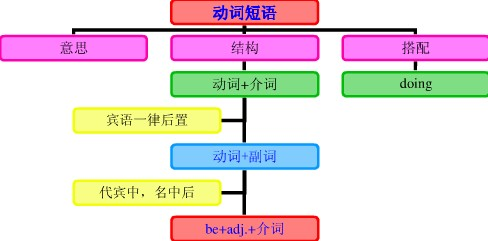本试题 “It is difficult to judge whether what he said ____.[ ]A. is worth to be praisedB. is worthy being praisingC. is worthy of being praisedD. is worth ...” 主要考查您对动词短语
动名词的被动式
等考点的理解。关于这些考点您可以点击下面的选项卡查看详细档案。
- 动词短语
- 动名词的被动式
动词短语的概念:
动词常和某些其他词类用在一起,构成固定词组,形成所谓短语动词(phrasalverb)。和动词一样,短语动词也可分为及物和不及物两种。短语动词可以作为一个整体看待,同一般动词一样使用。
动词短语的搭配类型:
1)动词+介词:这类短语动词用作及物动词,后面须跟宾语。
如:The small boy insisted on going with his parents. 那男孩坚持要跟父母一起去。
Do you often listen to broadcasts in English? 你常听英语广播吗?
Look at the children. Aren't they lovely? 看着这些孩子们。他们多么可爱呀!
We stand for self-reliance. 我们是主张自力更生的。
这一类的短语动词还有很多,如depend on(upon)(依靠),wait on(服侍),look for(寻找),deal with(对待),look after(照料),wait for(等待)等。
2)动词+副词:
这类短语动词有的用作及物动词,有的用作不及物动词。
如:I always get up as soon as the bell rings. 我总是一打铃就起床。(不及物)
Look out, there's a car coming! 当心,来汽车了!(不及物)
Have you handed in your exercises already? 你已经交练习了吗?(及物)
Please don't forget to put on your coat, it's cold outside. 请不要忘记穿外衣,外面很冷。(及物)
这一类的短语动词还有很多,及物如put out(扑灭),eat up(吃光),put down(放下);不及物如set off(出发),come up(走近),go on(继续)。
注:"动词+副词"这类短语动词和上面第一类"动词+介词"的不同之处在于:"动词+介词"用作及物动词,后面须跟宾语。"动词+副词"则有的及物,有的不及物;用作及物动词而宾语为人称代词或自身代词时,副词往往放在宾语之后。
如:Please wake me up at five tomorrow. 请在明天早上五点唤醒我。
If you have done your exercises, please hand them in. 如果你们练习做完了请交来。
She doesn't normally behave like that, she's putting it on. 她通常并不如此表现,她是装出来的。
注:这类短语动词有不少可兼作及物和不及物动词用。
如:He took off his hat when he entered the office. 他进办公室后脱下帽子。(及物)
The plane took off at seven sharp. 飞机在七点整起飞。(不及物)
Charlie rang up Neil to ask about the time of the meeting. 查理打电话给尼尔问开会的时间。(及物)
If you can't come, please ring up and let us know. 你如来不了,请来电话告诉我们一声。(不及物)
3)动词+副词+介词:
"动词+副词"之后有的可以再加一个介词,形成另一种短语动词。这类短语动词用作及物动词。
如:Do not give up hope. We must go on with the experiment 不要失望。我们必须继续试验。(go on with继续)
He came up to me. 他走到我跟前。(come up to走近)
这类短语动词还有:look down upon(看不起),do away with(去掉),put up with(忍受)等。
4)动词+名词+介词:
这类短语动词也是及物的。
如:He shook hands with all the guests at the banquet. 他在宴会上和宾客一一握手。
Young pioneers often come to the Children's Palace to take part in after school activities.少先队员经常到少年宫来参加课外活动。
Pay attention to the temperature of the stored rice. 注意仓库里的稻谷的温度。
Her job is taking care of the babies. 她的工作是照顾婴儿。
这一类短语动词还有:put an end to(结束),take notice of(注意),catch hold of(抓住),lose sight of(看不见),make use of(利用)等。
动词短语知识体系:

动名词的被动式的概念:
表示动名词的逻辑主语是行为承受者,如:I like being given harder work. 我喜欢接受难点的工作。
动名词被动式的用法:
当动名词的逻辑主语与动名词为被动关系时,动名词则要用被动式:
如:He didn't mind being left at home. 把他留在家里他并不介意。
It felt funny being called Grand mother. 被人叫作祖母感到怪怪的。
This question is far from being settled. 这个问题远没解决。
【注】(1)在表示“需要”的动词need, want, require后接动名词时,习惯上要用主动式表示被动意义(但若用不定式,则用主动式表示被动意义):
如:The outside of the house needs painting [to be painted]. 这房子外面需要油漆了。
The machine requires repairing [to be repaired]. 这机器需要修理了。
(2)在beworth后接动名词时也要用主动式表示被动意义:
如:This might be worth thinking about. 这可能值得考虑。
The clock is hardly worth repairing. 这台钟简直不值得修理。
关于动名词被动式的用法应注意以下两点:
1、动名词一般式的被动式:
动名词的主动式表明它与其逻辑主语之间为主动关系,而动名词的被动式则表明它与其逻辑主语之间为被动关系。
如:She likes being looked at. 她喜欢被人瞧。
He hates being interrupted. 他不愿意人打断她的话。
He was afraid of being at tacked. 他担心受人攻击。
He objected to being treated as a child. 他反对被当成孩子看待。
2、动名词完成式的被动式:
动名词完成式的被动式有两个语法特征,一是表明它与其逻辑主语之间为被动关系,二是它表明它先于主要动作完成。
如:She's angry about not having been invited. 她对没有受到邀请感到生气。
I can't forgive myself for having been taken by surprise. 我不能原谅自己被打了个冷不防。
He is ashamed of having been scolded by his teacher. 他对自己被老师责备一事感到很丢脸。
由于动名词的一般式有时也可以表示先于主要动作的被动动作,所以动名词的完成被动式有时也可简化为一般式的被动式,即省去“having been+过去分词”中的having been。
如:He resented being(having been)accused.他受到指责很生气。
与“It is difficult to judge whether what he said ____.[ ]A. ...”考查相似的试题有:
- If we learn to accept change and appreciate what is new and different, we will be well-prepared for whatever the futu...
- Will you _____ the clock? It’s slow.A.adjustB.fastenC.adaptD.Repair
- With so many things mixed up it's hard to ______ what's what.[ ]A. give outB. turn outC. make outD. take out
- —What do you think of your step-mother?—There are some things that are not easy to______, but on the whole she is a g...
- Whoever is_________ to the demanding job will be offered the well-paid one.A.frequentB.equalC.nativeD.familiar
- We must the train being late it always is.A.allow forB.allow ofC.allow toD.allow with
- The building around the corner caught fire last night.The police are now ________ the matter.[ ]A.seeing throughB.w...
- So excited was the winner that he couldn’t say any word to his feelings.A.exposeB.conveyC.displayD.deliver
- The young man _____ the car hoping to arrive at the station to meet his girlfriend on time.A.gave upB.sped upC.tur...
- While shopping, can you resist ________to buy anything that you don't really need?[ ]A. being persuadedB. persuadingC...